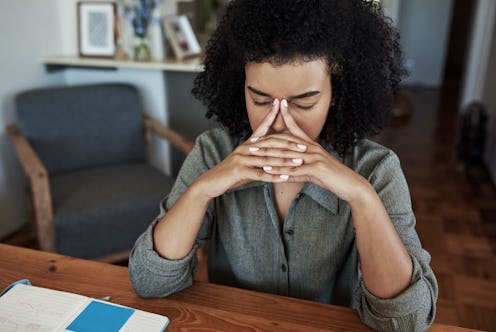Mental Health
Here’s Why Anxiety Can Give You The Chills
Is it cold in here, or did your boss just Slack you “K.“?

It’s definitely not cold out, but you can’t seem to stop shivering. If you’re noticing that you always seem to get a case of the shakes before big interviews or stressful phone calls with your mom, it might help you sit a little stiller and breathe a little easier when you figure out why anxiety causes chills.
How Does Anxiety Impact Your Body?
Those midnight freak-outs don’t just impact your mind — the rest of your body can also be affected when your mind just won’t settle. “When our anxiety is strong, it can trigger our sympathetic nervous system, also known as our fight or flight response,” says Sherese Ezelle, L.M.H.C., a licensed behavioral therapist at One Medical.
Don’t be surprised if your heart rate goes through the roof, Ezelle says. When you’re anxious, you might have some trouble breathing, you may get nauseous, and — yes — you can start shaking. It’s distressing, to be sure, but Ezelle tells Bustle that these physical responses to anxiety are very common.
Of course, Ezelle advises checking in with your doctor before automatically concluding that anxiety is what’s causing your shakes. Keeping a journal of your feelings and your shivers can help you work together to narrow down causes, but it doesn’t hurt to rule out other physiological causes of chills.
Why Does Anxiety Make You Shake?
Trembling when you’re scared or anxious is part of your body trying to protect you, explains Rachel Busman, Psy.D., a clinical psychologist and senior director of the Child Mind Institute. “Your heart rate increases to send more blood to big muscle groups (to fight or run) and energy is diverted away from other functions (like digestion, which can cause stomach aches or nausea),” she says. A part of that shift in blood flow is sending a lot of extra blood to your limbs to prepare you to fight or run away. When you don’t physically do those things, Busman says, “you can have tremors or shakes because the energy is there and needs a release.” The changes to your blood flow might also cause you to start sweating, Busman adds, which can also give you chills.
“These physical changes are part of your natural survival instinct and are meant to help you escape danger,” she explains. Still, it’s understandable if you hate the sensation. “It can be like an alarm going off when it does not need to, which can be scary and make us feel worse,” she says.
How Can You Calm Your Anxiety Shivers?
If you’re looking to have a better handle on your anxiety, Ezelle suggests tuning into your body’s patterns. “Being aware of these cues is a great anxiety management tool because it allows them to preventatively utilize coping skills lessening the impact of feelings of anxiety over their ability to function,” she explains. To reduce your anxiety chills, Ezelle suggests using immediate coping skills like deep breathing and grounding exercises (like counting five things around you that you can see, five things you can touch, five things you can hear, etc.).
You don’t have to wait until you’re shaking like a leaf to practice self-soothing, Ezelle says. “Even if you are not in the throws of anxiety, practice deep breathing, use of healthy affirmation (i.e. ‘this will pass,’ ‘right now I’m okay,’ ‘I know what to do to feel better,’ or ‘I know where to get more help if I need it’),” she suggests. “This helps to build this into a habit, similar to muscle memory — practicing these skills will help you recall them quickly and give you the clear guidance that you will be OK.”
Experts:
Sherese Ezelle, L.M.H.C., licensed behavioral therapist at One Medical
Rachel Busman, Psy.D., clinical psychologist, senior director of the Child Mind Institute
This article was originally published on